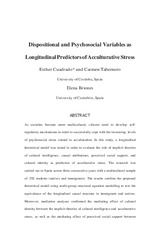Dispositional and Psychosocial Variables as Longitudinal Predictors of Acculturative Stress
Autor
Cuadrado, Esther
Tabernero Urbieta, Carmen
Briones, Elena
Editor
WileyFecha
2012Materia
Acculturative stressImplicit theories of cultural intelligence
Causal attributions
Perceived social support
Cultural identity
METS:
Mostrar el registro METSPREMIS:
Mostrar el registro PREMISMetadatos
Mostrar el registro completo del ítemResumen
As societies become more multicultural, citizens need to develop self-regulatory mechanisms in order to successfully cope with the increasing levelsof psychosocial stress related to acculturation. In this study, a longitudinaltheoretical model was tested in order to evaluate the role of implicit theoriesof cultural intelligence, causal attributions, perceived social support, and cul-tural identity as predictors of acculturative stress. The research was carriedout in Spain across three consecutive years with a multicultural sample of 292students (natives and immigrants). The results confirm the proposed theo-retical model using multi-group structural equation modelling to test theequivalence of the longitudinal causal structure in immigrants and natives.Moreover, mediation analyses confirmed the mediating effect of cultural iden-tity between the implicit theories of cultural intelligence and acculturativestress, as well as the mediating effect of perceived social support betweencausal attributions and acculturative stress. The model indicates the relevanceof promoting psychosocial interventions with native and immigrant adoles-cents in intercultural contexts. In those interventions, it will be relevant topromote incremental implicit theories of cultural intelligence and internalcausal attributions, as well as to highlight a more intercultural identity and toencourage greater social support networks.

